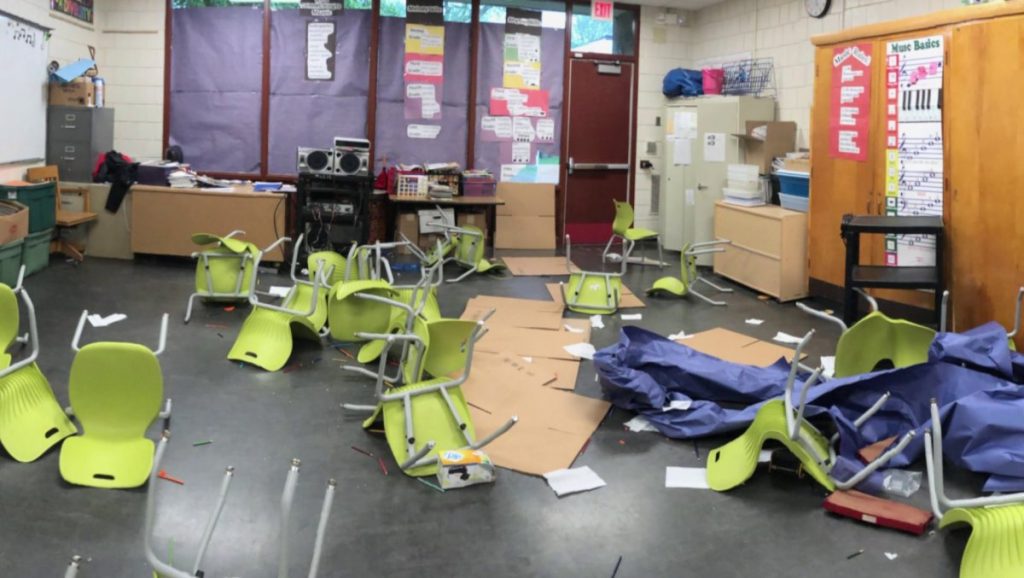There are an increasing number of news articles, opinion pieces, and anecdotal evidence that students are becoming increasingly disrespectful, verbally and physically violent. Many teachers I know have described teaching as becoming more and more difficult and exhausting.
A recent television news report described how teachers in Des Moines, Iowa, feel unsupported by administration and parents as they try to deal with children (grades K-12) who used foul language towards peers and teachers, and children who “lose it” so violently that the teacher must evacuate the rest of the class to the hallway while the student destroys the classroom. https://whotv.com/2019/05/31/extreme-violent-student-behavior-pushing-iowa-teachers-to-breaking-point/

When I did an internet search on “violent children elementary”, I got thousands of hits, from almost every state in the US and from many countries world-wide. Clearly this phenomenon is not isolated to Iowa, let alone the US. And it is not confined to elementary student either.
These articles offer dozens of ideas on why this behavior seems to be on the rise. They suggest or lay the blame on many different reasons, like the following:
- parents who raise their children too permissively,
- teachers who do not know how to manage a classroom
- colleges that do not prepare teachers properly
- unmet physical or emotional needs,
- integrating special needs children into the mainstream before they are ready,
- too much “screen time” or exposure to violence through media and video games
- a lack of free time to play
- overwhelming boredom with and lack of engagement in school
- experiencing childhood trauma,
- social disrespect of teachers
- a society that idolizes teaching as a calling and expects teachers to do it all without compensation or support
- administration that is unable or unwilling to deal with disrespect or violence harshly enough
- in Iowa, the law that says students may not be restrained or isolated even if they are having a violent episode unless it is to prevent them from hurting themselves or others
- a lack of money for mental health services for students
- a lack of social support for mental health services for young children
Probably for every proposed cause, there is another article refuting that reason and proposing another.
There are fewer, but many, opinion pieces written by parents that say that whatever the reasons, their child deserves an education free of the fear of violence, and an education uninterrupted by disrespectful and violent classmates.
There are dozens of articles examining the how and why on childhood violence and trauma published by the National Institutes of Health You can see this list at https://search.nih.gov/search?utf8=%E2%9C%93&affiliate=nih&query=violence+children&commit=Search
As many articles as we see on violence and disrespect, we see and equal number telling us
- we need to engage students with media or interesting projects,
- we need to keep students entertained
- we need to teach social and emotional skills
- we need to teach self-regulation skills
- we need to make education relevant
- we need to reward students who do the right thing

Whatever the causes or solutions, it is very difficult to hang on to the reasons why one became a teacher when one feels surrounded by chaos and are constantly struggling to keep control. And the constantly changing initiatives to try to resolve the situation is liable to give a teacher whiplash.
There is often a kernel of truth in every article on the causes or solutions for extreme behavior and violence in the classroom. I have opinions on many of the proposed causes and on ways to confront these. In addition, walking around in schools and observing in classrooms has shown me that there are classrooms where students appear to be better behaved than in others. I also have opinions on the myriad of proposals to keep students interested in school and to keep them engaged enough to behave in ways that educators call “appropriate.”
What I would really like to know is this:
- What do teachers see as the difference between classrooms that are relatively better behaved than others?
- What do teachers believe is the main cause of violence among school children in K-12?
- What are the top three things teachers believe need to be done to turn this problem around?
Please comment or visit my Facebook page (Roe’s Rules: Classroom Management for THAT Student) and join the discussion there.
